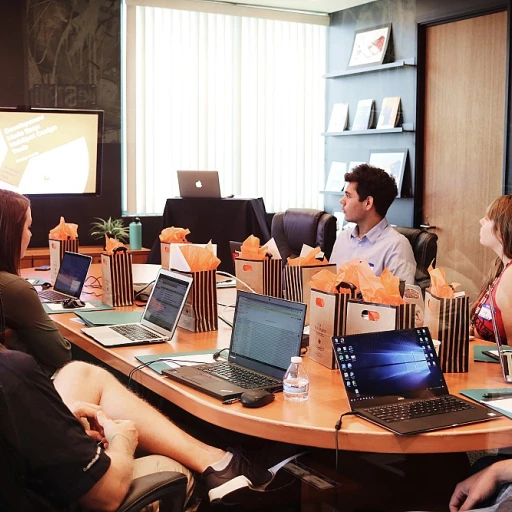
Nurturing Well-being in the Office: A Roadmap for the Arabian Emirate Managers
Strategies for Enhancing Employee Well-being in the Office Scene
Today, office managers have recognized the indispensable role that employee well-being plays in the productivity and success of a business. Implementing strategies for enhancing well-being within the office premises isn't just about ticking a box for corporate social responsibility; it's about investing in the engine of your business—the workforce. Comprehensive well-being programs may incorporate several dimensions, including physical health, mental wellness, social connectedness, and financial security, among others.
For an office manager, the first step towards nurturing well-being is conducting a holistic needs assessment. Understanding the unique stressors and challenges faced by employees in the Arabian Emirate context can guide the creation of a tailored well-being program. This might involve initiating health-promoting activities, providing mental health days, and even redesigning the workspace to enhance comfort and ergonomics.
An example of putting this into action could be organizing weekly yoga sessions to address stress management, or providing healthier food options in the office cafeteria to encourage better eating habits. Office managers can refer to MagicOffice's insights on crafting therapeutic work environments for further inspiration.
Empowering Employees with Autonomy and Flexibility
To foster a culture of well-being, empowerment is key. Gone are the days when a one-size-fits-all approach was sufficient. Personalization and flexibility reign supreme in modern office management. Granting employees more control over their work schedules, conditions, and environment can significantly improve their work-life balance and, by extension, their overall well-being.
Remote work and flexible hours have become increasingly prevalent, particularly post-pandemic, as they have been shown to reduce stress and burnout rates. Involving employees in the decision-making process when it comes to their work conditions can lead to a more dedicated and satisfied team. For example, allowing staff to choose between working from home or coming to the office on certain days can help them manage their personal responsibilities alongside their professional ones more effectively.
Professional Growth and Recognition as Pillars of Well-being
The Arabian Emirate work environment is dynamic and forward-thinking, recognizing that professional growth and personal development are integral to employee well-being. Providing opportunities for skill development, career advancement, and acknowledging achievements can significantly increase employees' job satisfaction and sense of belonging.
Statistics indicate that when employees feel their career growth is supported by their employers, they are more engaged and motivated. Encouraging participation in workshops, seminars, and continued education can help employees feel valued and invested in. Furthermore, implementing recognition programs—celebrating both small wins and major milestones—can boost morale and foster a healthy, achievement-oriented work culture.
Achieving the Perfect Symmetry: Work-Life Balance Tactics for Today's Office Managers
Achieving the Perfect Symmetry: Work-Life Balance Tactics for Today's Office Managers
Customizing Flexible Work Arrangements
Modern office managers are recognizing the importance of flexible work schedules in fostering a healthier work-life balance. Innovative approaches, such as staggered hours and remote working capabilities, not only accommodate individual employee needs but also ensure sustained productivity. By leveraging flexible arrangements, managers in the Arabian Emirate can cater to diverse workforce preferences while maintaining a cohesive office environment.
Empowering Employees Through Time Management
Office managers are instrumental in influencing how employees manage their time. Providing tools and training for effective time management is crucial. This includes setting clear goals, breaking tasks into manageable units, and prioritizing responsibilities. Moreover, managers should encourage regular breaks to recharge, which, according to numerous studies, can lead to a significant boost in overall productivity and mental well-being.
Leveraging Technology for Seamless Operations
Adopting cutting-edge technology streamlines office management and provides employees with the means to work efficiently. From collaborative software to project management tools, the right technology reduces time lost to manual processes and increases time available for personal life pursuits. Consequently, smart office technology is a powerful ally in achieving the coveted work-life balance within the Arabian Emirate's dynamic business landscape.
Promoting a Culture of Health and Wellness
A culture that prioritizes health and wellness is a hallmark of a balanced office life. Initiatives such as organizing wellness challenges, providing healthy snacks, and facilitating access to mental health resources are strategies that resonate with the ethos of modern Emirate offices. Office managers can lead by example, demonstrating a commitment to work-life harmony that echoes through every tier of the organization.
Enabling Continuous Professional Development
The pursuit of work-life harmony should not come at the expense of career growth. Office managers can support their teams by providing opportunities for skill enhancement and professional development. This can be achieved through offering in-house training, e-learning platforms, or supporting attendance at industry-relevant events. Such endeavors not only boost morale but also ensure that employees feel valued and invested in their roles, complementing their work-life equation.






-large-teaser.webp)



-large-teaser.webp)


